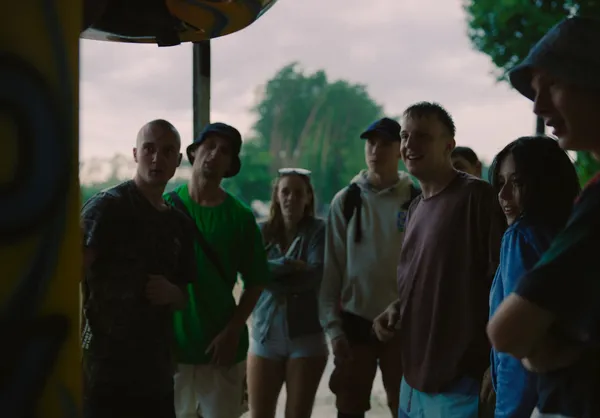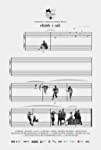Eye For Film >> Movies >> Bread And Salt (2022) Film Review
Bread And Salt
Reviewed by: Jennie Kermode

The experience of being gay or bisexual isn’t just about falling in love or coming out, even if the plethora of films on those subjects might prompt one to think so. It is also, all too often, about silence. Fear of doing or saying the wrong thing in potentially volatile circumstances makes it easier to do or say very little. Fear of displaying the wrong emotion makes it easier to keep an emotional distance, especially in situations which one knows one won’t have to deal with for very long.
Tymek (Tymoteusz Bies) left his home town three years ago to study music in Warsaw. He’s only home for the summer, planning to go on from there to a two year scholarship in Germany. That in itself could be enough to inspire hostility in this small community where most people don’t have much ambition or much hope, and he’s careful who he discusses it with. He can at least relax iin that way around his younger brother, Jacek (played by his real life brother, Jacek Bies), as he is theoretically on the same career path, though it’s vital that he pass his next exam if he is to stay in the game. Tymek worries that Jacek is too distracted by his girlfriend, Ania. Jacek assumes that Tymek must have a girlfriend, or several, in Warsaw. They play piano together, hands on the keyboard captured in close-up, square format, intimate both physically and experientially.

Their flat, in a sprawling housing estate, is clean and bright. Their mother makes the best pierogi, they say. She keeps a pet bird. There’s a love and diligence here which explains the boys’ success. It does not extend far beyond the door. In the streets and courtyards, young people roam around, bored and listless, or sit on the kerbside drinking, smoking cigarettes, taking drugs. Other hobbies include swimming in a nearby lake or noising up the immigrants who run the recently established Namid Kebab. We see one of these men, Youssef (Nadim Suleiman), on a night bus as Tymek is travelling home with his friend Nikola. Other local boys get on board, taunt him, take his bag. Though Nikola attempts to dissuade or distract them, nobody else intervenes. Perhaps, for Tymek, the risk seems too high.
There’s a hint of flirtation between Tymek and Youssef in the kebab shop, by day, but it’s only a slight thing. Both are ground down by the weight of constant microaggressions, the local young people constantly sharing racist or homophobic attempts at humour. if you’ve been on the sharp end of such things yourself, you may find this exhausting to watch. Even if you haven’t, it’s impossible to escape the atmosphere of menace. At key moments, director Damian Kocur slows his camera right down. We drift through the estate, through the sort of spaces which an architect might have thought would look pretty, with no idea how disaffected young people would use them. There’s a continual sense that we are about to encounter an ambush. The tension keeps rising, all that pressure with nowhere to go. The end of this will not be pretty.
“Have you had bread and salt?” Tymek asks Youssef, referring to a traditional Polish welcome. In fact it’s Youssef and his colleague who have been doing all the welcoming, perhaps against their better judgement. Yet even as we are invited to sympathise with them, we see enough of their antagonists to understand that this isn’t just about individual malice – that these young people are the product of systemic decay. In one scene, one of them talks about his dad’s alcoholism, apologising when he sheds a tear and laughing it off. There is no support structure for the processing of emotion. Aggression and cruelty seem to be the only way to attain meaningful status, the only way to be sure of not becoming a target.
Most of the actors here are non-professionals. The Bies’ brothers’ experience lies mostly in their piano playing, and both deliver impressive musical performances here. Patiently tutoring the fictional Jacek, Tymek explains how a sequence of notes can speak differently depending on where emphasis is placed. This film, screening as part of the 2023 Kinoteka Polish Film Festival, seems to say something similar about the value attached to its characters.
Kinoteka Polish Film Festival 2023 takes place in venues across London, 9 March - 27 April
For further information and tickets: https://kinoteka.org.uk/
Reviewed on: 09 Mar 2023
















